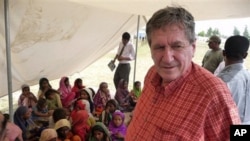Leaders in Pakistan and Afghanistan says they are deeply sorrowed by the sudden death of Richard Holbrooke, the United States special envoy for the two countries.
Since becoming the President Barack Obama's Special Representive for Afghanistan and Pakistan, Richard Holbrooke made frequent trips to the violence-plagued region for talks on how to defeat Islamic militancy and ensure economic stability in both the neighboring countries.
Pakistan Foreign Ministry spokesman Abdul Basit says Holbrooke was instrumental in bringing Afghanistan and Pakistan together, while making intensive efforts to strengthen Washington's ties with Islamabad. It will be difficult to fill the vacuum his sudden death has created, says Basit.
"I do not think that the aid and the momentum which has been created by him in the context of Pakistan-U.S. relations would be allowed to lose its momentum. I think both our countries, our governments are very committed to keep this relationship forward," he says. "I think this is a legacy of Mr. Holbrooke and Mr. Holbrooke very much wanted this relationship to grow so I think we would be doing all that could be done to sustain the legacy of Mr. Holbrooke."
Mr. Basit says he believes the late American diplomat's input will be instrumental in the review of the U.S. Afghan strategy President Obama is due to make public later this month.
"Nobody can deny the fact that Mr. Holbrooke had been playing a pivotal role in the context of Afghanistan," Basit says. "He was a major voice in giving direction to the U.S. strategy in dealing with the issues relating to Afghanistan. His involvement in the whole process was so intense and deep that he would be missed for a long time to come."
In Afghanistan, a spokesman for the foreign ministry said his government has a good strategic relationship with the United States and is deeply sorrowed by Holbrooke's death.
But Afghan President Hamid Karzai considered the American envoy ignorant of Afghan culture and sometimes refused to meet him. The relationship between the two men had been uneasy since they clashed over allegations of widespread rigging in last year's presidential election that won Mr. Karzai a new term in office.
But analysts say Afghanistan and Pakistan will miss Holbrooke, who had developed a very good understanding with officials and civil society groups in both countries. Tanveer Ahmed Khan is a former Pakistani diplomat and the head of Islamabad's Institute of Strategic Studies.
"He was one of the strong voices in Washington for helping Afghanistan and Pakistan in the economic field, in reconstruction so that the causes of militancy, intolerance, extremism that they would also be tackled," Khan says.
Holbrooke played a key role in persuading the Obama administration to increase the number of U.S. troops in Afghanistan and to provide more aid for development projects in order to reverse Taliban gains in the battlefield. But during his last trip to Islamabad in mid-November, the late U.S diplomat gave an open ended answer to the question of whether the strategy was producing results.
"First of all, I think you will know the success of the strategy, it will be evident if it works in the diminishing of violence, in the ability of people to resume their normal lives, in the decline of military incidents and the departure or disappearance of people fighting with the Taliban," Holbrooke said. "So I think that success will define itself and demonstrate itself."
But Holbrooke added an improved relationship between Pakistan and Afghanistan is vital to defeat terrorism.
"If the Afghan and the Pakistani governments do not work together there is no possibility of success and an end to this war," he said. "The enemy can always exploit the border, they can move across the border. The two countries have to work together to solve this problem. That is simply self evident."
Taliban insurgents have stepped up attacks on NATO and U.S forces in Afghanistan and the number of foreign troops killed this year in conflict-related incidents has been the highest since the war began in 2001.














